25 aug 2014
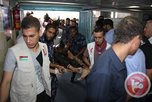
Dozens were injured in Israeli airstrikes in central Gaza City late Monday, medics said.
Ashraf al-Qidra, spokesman of the Ministry of Health, said that 25 Palestinians were injured in airstrikes targeting a house near al-Zahraa school in central Gaza City.
A witness told Ma'an that “a missile destroyed a house in the area injuring several; many of them are women and children.
”
Medical sources said that many were still under rubble.
Several houses and a mosque were damaged by the airstrikes.
Ashraf al-Qidra, spokesman of the Ministry of Health, said that 25 Palestinians were injured in airstrikes targeting a house near al-Zahraa school in central Gaza City.
A witness told Ma'an that “a missile destroyed a house in the area injuring several; many of them are women and children.
”
Medical sources said that many were still under rubble.
Several houses and a mosque were damaged by the airstrikes.

Egyptian sources told Ma'an on Monday that Cairo was awaiting an Israeli response on an Egyptian proposal to secure a ceasefire in the Gaza Strip.
The proposal includes opening the Rafah crossing, expanding the fishing area to six miles and opening Gaza’s trade crossings to allow reconstructing the enclave.
The sources added that Egypt presented the ceasefire proposal to Israel on Monday and that Israel promised to respond. Israeli officials showed "initial acceptance," one source said.
“The Palestinian factions agreed to the proposal and Egypt is expected to announce the acceptance of both parties to the ceasefire proposal tonight,” one of the sources said.
The official added: “Then serious negotiations will begin.”
A previous ceasefire to end the devastating conflict in Gaza collapsed on Aug. 19 after Egyptian mediators were unable to bridge the gaps between the two sides.
The conflict, now in its 49th day, has killed more than 2,100 Palestinians and 68 Israelis, mostly soldiers.
Hamas has insisted that any long-term truce must end the eight-year blockade of Gaza and allow for an airport in the coastal strip that is flanked by Israel and Egypt.
Israel says it wants Hamas to disarm, something the militants have refused to discuss.
The proposal includes opening the Rafah crossing, expanding the fishing area to six miles and opening Gaza’s trade crossings to allow reconstructing the enclave.
The sources added that Egypt presented the ceasefire proposal to Israel on Monday and that Israel promised to respond. Israeli officials showed "initial acceptance," one source said.
“The Palestinian factions agreed to the proposal and Egypt is expected to announce the acceptance of both parties to the ceasefire proposal tonight,” one of the sources said.
The official added: “Then serious negotiations will begin.”
A previous ceasefire to end the devastating conflict in Gaza collapsed on Aug. 19 after Egyptian mediators were unable to bridge the gaps between the two sides.
The conflict, now in its 49th day, has killed more than 2,100 Palestinians and 68 Israelis, mostly soldiers.
Hamas has insisted that any long-term truce must end the eight-year blockade of Gaza and allow for an airport in the coastal strip that is flanked by Israel and Egypt.
Israel says it wants Hamas to disarm, something the militants have refused to discuss.
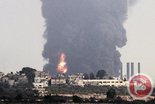
Three Israeli power lines that provide the Gaza Strip with electricity were damaged Monday, the director of public relations in Gaza’s power plant said.
Jamal al-Dardasawi told Ma'an that the power schedule went down from six hours to four hours after three Israeli power lines were damaged; two of them were broken from the Israeli side.
Al-Dardasawi added that repairing these lines depends on the approval of an Israeli company.
He added that the company was working with the power authority and specialized parties to repair the lines.
Al-Dardasawi said that an Egyptian company that provides electricity to Rafah will work on repairing the lines from inside Egypt from 9:00 a.m. to 3:00 p.m. Tuesday, which will cause a blackout in Rafah during this period.
Jamal al-Dardasawi told Ma'an that the power schedule went down from six hours to four hours after three Israeli power lines were damaged; two of them were broken from the Israeli side.
Al-Dardasawi added that repairing these lines depends on the approval of an Israeli company.
He added that the company was working with the power authority and specialized parties to repair the lines.
Al-Dardasawi said that an Egyptian company that provides electricity to Rafah will work on repairing the lines from inside Egypt from 9:00 a.m. to 3:00 p.m. Tuesday, which will cause a blackout in Rafah during this period.
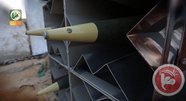
The Israeli army won’t dare to enter Gaza another time after the Palestinian resistance “rubbed the nose of their so-called elite brigades in the dirt in Gaza,” the Popular Resistance Committees said Monday.
In a statement, the group added that “the enemy’s leaders should ask their soldiers about what they suffered in Gaza when their folly led them to stage a ground invasion into Gaza.”
The statement said that the group’s military wing, the Salah al-Din Brigades, is entirely prepared to fight on the ground if the Israeli forces decide to invade the coastal enclave.
Similarly, the al-Mujahidin Brigades, another military group operative in the Gaza Strip, described Israeli threats to “renew the ground battle in Gaza as valueless.”
The group added in a statement that the Palestinian resistance would defend the Palestinian people and drive back the “Zionist aggression,” and concluded by saying that things have changed.
In a statement, the group added that “the enemy’s leaders should ask their soldiers about what they suffered in Gaza when their folly led them to stage a ground invasion into Gaza.”
The statement said that the group’s military wing, the Salah al-Din Brigades, is entirely prepared to fight on the ground if the Israeli forces decide to invade the coastal enclave.
Similarly, the al-Mujahidin Brigades, another military group operative in the Gaza Strip, described Israeli threats to “renew the ground battle in Gaza as valueless.”
The group added in a statement that the Palestinian resistance would defend the Palestinian people and drive back the “Zionist aggression,” and concluded by saying that things have changed.
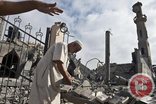
Halil Hazani, 74, looks at holy books collected from the rubble of a mosque that was partially damaged by an Israeli airstrike on August 25, 2014 in Beit Lahia in the northern Gaza Strip
Twelve Palestinians were killed on Monday as Israel launched airstrikes across the Gaza Strip, medics said.
Ahmad al-Dali and brothers Bassem and Ahmad Hijazi were killed when an airstrike targeted their car in Gaza City, medics said. Seven others were critically wounded in the strike.
Earlier, a woman and a child were killed after Israel targeted Raddad Tamboura's home in Beit Lahiya, while Muhammad Shubeir was killed in an airstrike on Gaza City.
Farhana al-Attar was killed in Beit Lahiya after a missile struck her home after midnight, medics said, while Yasin al-Biltaji and Yahya Abu Daqin were killed at dawn when Israeli warplanes fired missiles at a group of people in the Tuffah neighborhood of Gaza City.
Meanwhile, Hani Muhammad Yasin died of wounds he sustained several days ago while Nidal Badawi also died from injuries sustained Saturday in airstrikes on Rafah.
An Unidentified man was also killed in northern Gaza.
ICC action if Egypt proposal fails
The strikes came as a Palestinian official said Egypt had proposed a new ceasefire in Gaza that would open the blockaded enclave's crossings and allow in aid and reconstruction materials.
Palestinian Minister of Foreign Affairs Riyad al-Maliki said the Egyptian proposal was the "only solution," warning that if it fail the PLO would appeal to the UN Security Council.
"After signing the Rome Statute, Palestine will become a member in the ICC and we will officially request investigation into (Israeli) war crimes," al-Maliki said.
The ICC procedures may take years, but nothing will obstruct the investigations, he added.
The foreign minister stressed that Abbas wants to have the consent of all Palestinian factions before going to the ICC, will Mousa Abu Marzouq having already signed off for Hamas.
The president is still waiting for other factions to agree to the proposal, al-Maliki said.
Twelve Palestinians were killed on Monday as Israel launched airstrikes across the Gaza Strip, medics said.
Ahmad al-Dali and brothers Bassem and Ahmad Hijazi were killed when an airstrike targeted their car in Gaza City, medics said. Seven others were critically wounded in the strike.
Earlier, a woman and a child were killed after Israel targeted Raddad Tamboura's home in Beit Lahiya, while Muhammad Shubeir was killed in an airstrike on Gaza City.
Farhana al-Attar was killed in Beit Lahiya after a missile struck her home after midnight, medics said, while Yasin al-Biltaji and Yahya Abu Daqin were killed at dawn when Israeli warplanes fired missiles at a group of people in the Tuffah neighborhood of Gaza City.
Meanwhile, Hani Muhammad Yasin died of wounds he sustained several days ago while Nidal Badawi also died from injuries sustained Saturday in airstrikes on Rafah.
An Unidentified man was also killed in northern Gaza.
ICC action if Egypt proposal fails
The strikes came as a Palestinian official said Egypt had proposed a new ceasefire in Gaza that would open the blockaded enclave's crossings and allow in aid and reconstruction materials.
Palestinian Minister of Foreign Affairs Riyad al-Maliki said the Egyptian proposal was the "only solution," warning that if it fail the PLO would appeal to the UN Security Council.
"After signing the Rome Statute, Palestine will become a member in the ICC and we will officially request investigation into (Israeli) war crimes," al-Maliki said.
The ICC procedures may take years, but nothing will obstruct the investigations, he added.
The foreign minister stressed that Abbas wants to have the consent of all Palestinian factions before going to the ICC, will Mousa Abu Marzouq having already signed off for Hamas.
The president is still waiting for other factions to agree to the proposal, al-Maliki said.
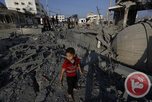
A Palestinian boy walks through the rubble of a mosque targeted in an Israeli airstrike in Gaza City on August 25, 2014
Egyptian mediators have proposed a new ceasefire in Gaza that would open the blockaded enclave's crossings and allow in aid and reconstruction materials, a senior Palestinian official said on Monday.
The Palestinians, including the de facto Hamas rulers of the enclave, would be willing to accept such a deal if Israel does, the official told AFP.
The proposal would defer to a later date negotiations on disputed points that have prevented a long-term ceasefire deal, he added.
An Egyptian official confirmed that mediators have contacted the Palestinians and Israel with a new proposal.
"There is an idea for a temporary ceasefire that opens the crossings, allows aid and reconstruction material, and the disputed points will be discussed in a month," the Palestinian official said.
"We would be willing to accept this, but are waiting for the Israeli response to this proposal," he said, requesting anonymity because of the sensitivity of the negotiations.
Another Palestinian official said Egypt might invite Palestinian and Israeli negotiating teams to return to Cairo in 48 hours.
A previous ceasefire to end the devastating conflict in Gaza collapsed on August 19 after Egyptian mediators were unable to bridge the gaps between the two sides.
The conflict, now in its 49th day, has killed more than 2,100 Palestinians and 68 Israelis, mostly soldiers.
Hamas has insisted that any long-term truce must end the eight-year blockade of Gaza and allow for an airport in the coastal strip that is flanked by Israel and Egypt.
Israel says it wants Hamas to disarm, something the militants have refused to discuss.
Egyptian mediators have proposed a new ceasefire in Gaza that would open the blockaded enclave's crossings and allow in aid and reconstruction materials, a senior Palestinian official said on Monday.
The Palestinians, including the de facto Hamas rulers of the enclave, would be willing to accept such a deal if Israel does, the official told AFP.
The proposal would defer to a later date negotiations on disputed points that have prevented a long-term ceasefire deal, he added.
An Egyptian official confirmed that mediators have contacted the Palestinians and Israel with a new proposal.
"There is an idea for a temporary ceasefire that opens the crossings, allows aid and reconstruction material, and the disputed points will be discussed in a month," the Palestinian official said.
"We would be willing to accept this, but are waiting for the Israeli response to this proposal," he said, requesting anonymity because of the sensitivity of the negotiations.
Another Palestinian official said Egypt might invite Palestinian and Israeli negotiating teams to return to Cairo in 48 hours.
A previous ceasefire to end the devastating conflict in Gaza collapsed on August 19 after Egyptian mediators were unable to bridge the gaps between the two sides.
The conflict, now in its 49th day, has killed more than 2,100 Palestinians and 68 Israelis, mostly soldiers.
Hamas has insisted that any long-term truce must end the eight-year blockade of Gaza and allow for an airport in the coastal strip that is flanked by Israel and Egypt.
Israel says it wants Hamas to disarm, something the militants have refused to discuss.
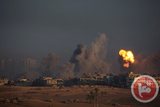
Israeli warplanes fired three missiles at the Rafah crossing late Sunday, causing major damage to a yard in the terminal, a Gaza official said.
Mahir Abu Sabha said the missiles created 15-meter deep craters at the crossing, which will remain open.
"We will operate over the rubble and nothing will prevent us from continuing our work," Abu Sabha said.
Israeli forces targeted the outer hall, which serves as a waiting area, earlier during its military offensive on the besieged enclave.
Mahir Abu Sabha said the missiles created 15-meter deep craters at the crossing, which will remain open.
"We will operate over the rubble and nothing will prevent us from continuing our work," Abu Sabha said.
Israeli forces targeted the outer hall, which serves as a waiting area, earlier during its military offensive on the besieged enclave.
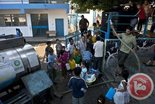
Mahmud carries a water hose after filling up a water tank at a UN school in Gaza City on August 23, 2014
Mohammed al-Khatib fears for his life every time he gets behind the wheel. In wartime, providing drinking water to homes and schools in Gaza means dicing with death.
At 23, Khatib is a veteran of two previous wars between Hamas and Israel, in 2008 and 2012, but nothing prepared him for the bombings, shredded nerves and death toll this time around.
"When I'm driving, I always feel frightened, upset and nervous," he tells AFP in the small warehouse where he loads up his truck with drinking water, as Israeli air strikes boom in the distance.
It's an essential job in Gaza, where at least 90 percent of municipal running water is not fit to drink and war damage means that for many people the only water comes from private vendors or desalination plants.
But at his boss Hossam Huneif's desalination plant, down a sandy track in Gaza City, Khatib is one of the few drivers who turn up. Many of the regulars have stayed away since war broke out in July.
Khatib says he is exhausted by over-working, and lack of security, fuel and electricity. Then there are the horrors he has encountered.
"Perhaps I'll go to fill a house with water and find that house has been targeted by an Israeli air strike.
"For example, the Mata family -- I always filled their tank, then one day we went and their house wasn't there anymore. It was bombed."
Three of his friends have been killed and others have been injured. At home his family of eight has swollen to 30, as they welcome in refugees escaping the worst fighting in eastern Gaza.
"Mohammed has a brave heart," smiles Huneif, the plant owner.
Pointing at another driver who has just sauntered into the warehouse, he adds: "when he hears a bomb going off, he stays at home."
"If there is bombing after 3 p.m., his wife calls him all the time saying 'come home,' 'come home'," Huneif chuckles.
"There's another driver who's only been to work one day since the war started. His family locked the door and said you can't work!"
Huneif owns the plant, a smart title for the small warehouse on a corner block where donkey carts rumble past.
Trucks are parked around the corner. In the morning, they fill up with water and set off to supply schools and homes across north and central Gaza, navigating craters and rumbling past bombed-out wrecks.
The charity Oxfam estimates at least 600,000 people -- a third of Gaza's 1.8 million population -- are without running water.
Many others get running water as little as one or two hours every two days, such as in the badly destroyed neighborhood of Shujaiyeh, and repairs have been on hold since air strikes resumed.
'Fear. Death. That's what I feel'
Before the war Huneif was fending off growing competition from other desalination plants.
In wartime, his 24-year-old son Mahmud, fresh out of university and an IT specialist, has had to take on shifts to replace drivers too nervous to work.
"At the beginning of the war, I didn't have a problem distributing water but after the tanks and soldiers came in and people evacuated to the center I faced many difficulties," Mahmud says.
"People would stop the truck in the middle of the street, saying 'please, my child doesn't have water to drink,' and people would climb onto of the vehicle in their rush to get water," he adds.
Wearing cut-off green trousers and with gelled hair, he fishes out his smart phone to show a short video of the incident that perhaps scared him the most.
One day when he was handing out water, there was an air strike right in the street in front of him. People fled the truck in panic as ambulances, sirens wailing, rushed to the spot.
The jumpy footage shows paramedics pulling a blanket over a dead body in the road. But it wasn't his only close shave.
"Fear. Death. That's what I feel," he says.
Then there was the time he took water to a regular customer and the neighboring house was bombed.
Mahmud says he happened to be in the next street when a series of Israeli bombs targeted Hamas's military commander Mohammed Deif, flattening a building and killing Deif's wife and two children.
But it's not safe back at the warehouse either.
"Yesterday open land was bombed just 100 meters from here," says his father. "But we have to keep working. This is a humanitarian job. It's not just a private company to earn money."
Mohammed al-Khatib fears for his life every time he gets behind the wheel. In wartime, providing drinking water to homes and schools in Gaza means dicing with death.
At 23, Khatib is a veteran of two previous wars between Hamas and Israel, in 2008 and 2012, but nothing prepared him for the bombings, shredded nerves and death toll this time around.
"When I'm driving, I always feel frightened, upset and nervous," he tells AFP in the small warehouse where he loads up his truck with drinking water, as Israeli air strikes boom in the distance.
It's an essential job in Gaza, where at least 90 percent of municipal running water is not fit to drink and war damage means that for many people the only water comes from private vendors or desalination plants.
But at his boss Hossam Huneif's desalination plant, down a sandy track in Gaza City, Khatib is one of the few drivers who turn up. Many of the regulars have stayed away since war broke out in July.
Khatib says he is exhausted by over-working, and lack of security, fuel and electricity. Then there are the horrors he has encountered.
"Perhaps I'll go to fill a house with water and find that house has been targeted by an Israeli air strike.
"For example, the Mata family -- I always filled their tank, then one day we went and their house wasn't there anymore. It was bombed."
Three of his friends have been killed and others have been injured. At home his family of eight has swollen to 30, as they welcome in refugees escaping the worst fighting in eastern Gaza.
"Mohammed has a brave heart," smiles Huneif, the plant owner.
Pointing at another driver who has just sauntered into the warehouse, he adds: "when he hears a bomb going off, he stays at home."
"If there is bombing after 3 p.m., his wife calls him all the time saying 'come home,' 'come home'," Huneif chuckles.
"There's another driver who's only been to work one day since the war started. His family locked the door and said you can't work!"
Huneif owns the plant, a smart title for the small warehouse on a corner block where donkey carts rumble past.
Trucks are parked around the corner. In the morning, they fill up with water and set off to supply schools and homes across north and central Gaza, navigating craters and rumbling past bombed-out wrecks.
The charity Oxfam estimates at least 600,000 people -- a third of Gaza's 1.8 million population -- are without running water.
Many others get running water as little as one or two hours every two days, such as in the badly destroyed neighborhood of Shujaiyeh, and repairs have been on hold since air strikes resumed.
'Fear. Death. That's what I feel'
Before the war Huneif was fending off growing competition from other desalination plants.
In wartime, his 24-year-old son Mahmud, fresh out of university and an IT specialist, has had to take on shifts to replace drivers too nervous to work.
"At the beginning of the war, I didn't have a problem distributing water but after the tanks and soldiers came in and people evacuated to the center I faced many difficulties," Mahmud says.
"People would stop the truck in the middle of the street, saying 'please, my child doesn't have water to drink,' and people would climb onto of the vehicle in their rush to get water," he adds.
Wearing cut-off green trousers and with gelled hair, he fishes out his smart phone to show a short video of the incident that perhaps scared him the most.
One day when he was handing out water, there was an air strike right in the street in front of him. People fled the truck in panic as ambulances, sirens wailing, rushed to the spot.
The jumpy footage shows paramedics pulling a blanket over a dead body in the road. But it wasn't his only close shave.
"Fear. Death. That's what I feel," he says.
Then there was the time he took water to a regular customer and the neighboring house was bombed.
Mahmud says he happened to be in the next street when a series of Israeli bombs targeted Hamas's military commander Mohammed Deif, flattening a building and killing Deif's wife and two children.
But it's not safe back at the warehouse either.
"Yesterday open land was bombed just 100 meters from here," says his father. "But we have to keep working. This is a humanitarian job. It's not just a private company to earn money."
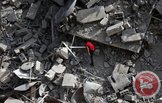
A Palestinian man inspects the rubble of an 12-storey apartment building that collapsed the day before after it was hit by missiles during an Israeli air strike in the heart of Gaza City, August 24, 2014
Seven Palestinians have been killed in Gaza since midnight by Israeli airstrikes, medical officials said, while a further two died from wounds sustained in earlier attacks.
In the latest airstrikes, an unidentified man was killed in northern Gaza.
Earlier, a woman and a child were killed after Israel targeted a home in Beit Lahiya. Five people were injured in the strike on Raddad Tamboura's home.
Muhammad Shubeir was also killed in an airstrike in Gaza City.
Meanwhile, Hani Muhammad Yasin died of wounds he sustained several days ago while Nidal Badawi also died from injuries sustained Saturday in airstrikes on Rafah.
Earlier, three Palestinians were killed overnight Sunday as Israel's air-force targeted over 30 sites in the Gaza Strip, medical officials said.
Farhana al-Attar was killed in Beit Lahiya after a missile struck her home after midnight, medics said.
Yasin al-Biltaji and Yahya Abu Daqin were killed at dawn when Israeli warplanes fired missiles at a group of people in the Tuffah neighborhood of Gaza City.
Dozens were injured in the strike.
In Rafah, two Palestinians were injured by an Israeli airstrike near the crossing terminal, while seven people were injured in Jabalia when an Israeli strike destroyed the al-Kahlut family home.
The al-Ghoul, Nuthur, Karaja, and Abu Aun family homes were destroyed in targeted strikes overnight, witnesses said.
The Omar Ibn Abd al-Aziz mosque was destroyed in Beit Hanoun, together with the Ali Ibn Abu Talib mosque in Gaza City.
At least than 2,120 Palestinians and 68 people on the Israeli side, all but four of them soldiers, have been killed since July 8.
The United Nations says 70 percent of the Palestinian victims were civilians, and that among the dead were 478 children.
Around 460,000 people have fled their homes in Gaza -- more than a quarter of the densely-populated Mediterranean enclave's 1.8 million population.
Seven Palestinians have been killed in Gaza since midnight by Israeli airstrikes, medical officials said, while a further two died from wounds sustained in earlier attacks.
In the latest airstrikes, an unidentified man was killed in northern Gaza.
Earlier, a woman and a child were killed after Israel targeted a home in Beit Lahiya. Five people were injured in the strike on Raddad Tamboura's home.
Muhammad Shubeir was also killed in an airstrike in Gaza City.
Meanwhile, Hani Muhammad Yasin died of wounds he sustained several days ago while Nidal Badawi also died from injuries sustained Saturday in airstrikes on Rafah.
Earlier, three Palestinians were killed overnight Sunday as Israel's air-force targeted over 30 sites in the Gaza Strip, medical officials said.
Farhana al-Attar was killed in Beit Lahiya after a missile struck her home after midnight, medics said.
Yasin al-Biltaji and Yahya Abu Daqin were killed at dawn when Israeli warplanes fired missiles at a group of people in the Tuffah neighborhood of Gaza City.
Dozens were injured in the strike.
In Rafah, two Palestinians were injured by an Israeli airstrike near the crossing terminal, while seven people were injured in Jabalia when an Israeli strike destroyed the al-Kahlut family home.
The al-Ghoul, Nuthur, Karaja, and Abu Aun family homes were destroyed in targeted strikes overnight, witnesses said.
The Omar Ibn Abd al-Aziz mosque was destroyed in Beit Hanoun, together with the Ali Ibn Abu Talib mosque in Gaza City.
At least than 2,120 Palestinians and 68 people on the Israeli side, all but four of them soldiers, have been killed since July 8.
The United Nations says 70 percent of the Palestinian victims were civilians, and that among the dead were 478 children.
Around 460,000 people have fled their homes in Gaza -- more than a quarter of the densely-populated Mediterranean enclave's 1.8 million population.

Israeli military sources say Egypt could announce a one-month ceasefire agreement in Gaza on Monday after mediators made significant progress, Israeli news site Walla reported.
According to the Hebrew language site, Egypt will make the announcement late Monday, with both Hamas and Islamic Jihad having reportedly agreed to the deal.
The agreement includes the first stage of opening the Rafah crossing and the expansion of the Gaza's fishing zone to 12 nautical miles, Walla reported.
Israel will also gradually allow more commercial products into Gaza, including construction material, via the Kerem Shalom crossing if the ceasefire is maintained.
On Sunday, Hamas chief Khaled Mashaal said that the group insists that the siege on Gaza is lifted and that Gazans were being starved by a lack of food and medicine.
Speaking to an Iranian TV station, the Hamas leader said negotiations with Israel were pointless as nothing as been achieved through talks.
"Only by force and pressure did Israel give us land back," Mashaal said.
According to the Hebrew language site, Egypt will make the announcement late Monday, with both Hamas and Islamic Jihad having reportedly agreed to the deal.
The agreement includes the first stage of opening the Rafah crossing and the expansion of the Gaza's fishing zone to 12 nautical miles, Walla reported.
Israel will also gradually allow more commercial products into Gaza, including construction material, via the Kerem Shalom crossing if the ceasefire is maintained.
On Sunday, Hamas chief Khaled Mashaal said that the group insists that the siege on Gaza is lifted and that Gazans were being starved by a lack of food and medicine.
Speaking to an Iranian TV station, the Hamas leader said negotiations with Israel were pointless as nothing as been achieved through talks.
"Only by force and pressure did Israel give us land back," Mashaal said.
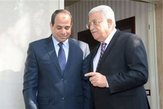
Palestinian President Mahmoud Abbas concluded, on Sunday, his three-day visit to Egypt as part of his effort to reach a permanent ceasefire in Gaza.
Following a meeting with Egyptian President Abdul-Fattah al-Sisi, on Saturday, Mr. Abbas stressed that stopping the bloodshed in Gaza is a top priority for Palestinian leadership, and that both leaders agreed on what a clear and permanent ceasefire in the Gaza Strip might look like, according to WAFA.
During his visit, Abbas also held meetings with Arab League Secretary-General, Nabil al-Arabi, Egyptian Minister of Foreign Affairs, Sameh Shukri, and Algerian Minister of Foreign Affairs, Ramadan La’mamreh.
He additionally met with Egyptian Intelligence Minister, Mohammad Tuhami, as well as delegations from the Popular Front for the Liberation of Palestine and the Islamic Jihad movement, among others.
Egyptian-brokered ceasefire talks have failed, recently, following indirect negotiations between Palestinian and Israeli sides in Cairo. However, Egypt continues to urge both sides to return to the negotiating table, in order to advance a peaceful solution.
The Gaza Strip has been under severe economic blockade since 2006, further bolstered by the Egyptian government since 2007. The end of the blockade is crucial in achieving goals set by legitimate Palestinian demands.
Following a meeting with Egyptian President Abdul-Fattah al-Sisi, on Saturday, Mr. Abbas stressed that stopping the bloodshed in Gaza is a top priority for Palestinian leadership, and that both leaders agreed on what a clear and permanent ceasefire in the Gaza Strip might look like, according to WAFA.
During his visit, Abbas also held meetings with Arab League Secretary-General, Nabil al-Arabi, Egyptian Minister of Foreign Affairs, Sameh Shukri, and Algerian Minister of Foreign Affairs, Ramadan La’mamreh.
He additionally met with Egyptian Intelligence Minister, Mohammad Tuhami, as well as delegations from the Popular Front for the Liberation of Palestine and the Islamic Jihad movement, among others.
Egyptian-brokered ceasefire talks have failed, recently, following indirect negotiations between Palestinian and Israeli sides in Cairo. However, Egypt continues to urge both sides to return to the negotiating table, in order to advance a peaceful solution.
The Gaza Strip has been under severe economic blockade since 2006, further bolstered by the Egyptian government since 2007. The end of the blockade is crucial in achieving goals set by legitimate Palestinian demands.
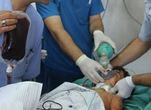
Wounded Child In Gaza
Palestinian medical sources have reported that two Palestinians have been killed, many injured, including some who suffered critical injuries, in the ongoing Israeli bombardment of Gaza.
The sources said resident Yassin Ibrahim al-Biltaji, 23, died of serious injuries suffered after the army bombarded Gaza. Several Palestinians have been injured in the attack.
The Ministry of Health said another Palestinian, identified as Yahia Abu Daqen, 27, has been killed close to the ad-Dorra Hospital in Gaza.
Many residents, including children, have been injured, some suffering life-threatening injuries in another Israeli bombardment, in Gaza.
Two more Palestinians have been seriously injured by Israeli shells close to the Rafah Border Terminal, in the southern part of the Gaza Strip; the wounded have been moved to the Abu Yousef an-Najjar Hospital.
In addition, at least twelve residents have been injured in an Israeli bombardment to the al-Fallujah area in northern Gaza, and were moved to the Kamal ‘Adwan Hospital, in northern Gaza Strip.
Killed Sunday, August 24
Yahia Saber Abu al-‘Omarein, Gaza.
Bader Hashem Abu Mnei’, 18, Gaza.
Mohammad Tal’at al-Ghoul, 30, Gaza City.
Zeinab Bilal Abu Taqiyya, 18 months, Gaza City.
Mohammad Wa’el al-Khodary, 17, Gaza City.
Mohammad Ibrahim al-Louqa, 21, Beit Lahia.
Mo’ayyad al-A’raj, 3, Khan Younis.
Adam Ahmad Khattab, 26, Deir al-Balah.
Mahmoud Ahmad al-‘Attar, 30, Deir Al-Balah.
Tasneem Essam Juda’,Tal al-Zatar.
Rawiya Juda’, son of Tasneem,Tal al-Zatar.
Raghad Juda’, son of Tasneem,Tal al-Zatar.
Osama Juda’, son of Tasneem,Tal al-Zatar.
Mohammad Juda', son of Tasneem,Tal al-Zatar.
Yassin Ibrahim al-Biltaji, 23, Gaza.
Yahia Abu Daqen, 27, Northern Gaza.
Palestinian medical sources have reported that two Palestinians have been killed, many injured, including some who suffered critical injuries, in the ongoing Israeli bombardment of Gaza.
The sources said resident Yassin Ibrahim al-Biltaji, 23, died of serious injuries suffered after the army bombarded Gaza. Several Palestinians have been injured in the attack.
The Ministry of Health said another Palestinian, identified as Yahia Abu Daqen, 27, has been killed close to the ad-Dorra Hospital in Gaza.
Many residents, including children, have been injured, some suffering life-threatening injuries in another Israeli bombardment, in Gaza.
Two more Palestinians have been seriously injured by Israeli shells close to the Rafah Border Terminal, in the southern part of the Gaza Strip; the wounded have been moved to the Abu Yousef an-Najjar Hospital.
In addition, at least twelve residents have been injured in an Israeli bombardment to the al-Fallujah area in northern Gaza, and were moved to the Kamal ‘Adwan Hospital, in northern Gaza Strip.
Killed Sunday, August 24
Yahia Saber Abu al-‘Omarein, Gaza.
Bader Hashem Abu Mnei’, 18, Gaza.
Mohammad Tal’at al-Ghoul, 30, Gaza City.
Zeinab Bilal Abu Taqiyya, 18 months, Gaza City.
Mohammad Wa’el al-Khodary, 17, Gaza City.
Mohammad Ibrahim al-Louqa, 21, Beit Lahia.
Mo’ayyad al-A’raj, 3, Khan Younis.
Adam Ahmad Khattab, 26, Deir al-Balah.
Mahmoud Ahmad al-‘Attar, 30, Deir Al-Balah.
Tasneem Essam Juda’,Tal al-Zatar.
Rawiya Juda’, son of Tasneem,Tal al-Zatar.
Raghad Juda’, son of Tasneem,Tal al-Zatar.
Osama Juda’, son of Tasneem,Tal al-Zatar.
Mohammad Juda', son of Tasneem,Tal al-Zatar.
Yassin Ibrahim al-Biltaji, 23, Gaza.
Yahia Abu Daqen, 27, Northern Gaza.
Page: 125 - 124 - 123 - 122 - 121 - 120 - 119 - 118 - 117 - 116 - 115 - 114 - 113 - 112 - 111 - 110 - 109 - 108
Truce violations List of names Pictures of martyrs
Days: Aug: 26 - 25 - 24 - 23 - 22 - 21 - 20 - 19 - 18 - 17 - 16 - 15 - 14 - 13 - 12 - 11 - 10 - 9 - 8 - 7 - 6 - 5 - 4 - 3 - 2 - 1
July: 31 - 30 - 29 - 28 - 27 - 26 - 25 - 24 - 23 - 22 - 21 - 20 - 19 - 18 - 17 - 16 - 15 - 14 - 13 - 12 - 11 - 10 - 9 - 8
Days: Aug: 26 - 25 - 24 - 23 - 22 - 21 - 20 - 19 - 18 - 17 - 16 - 15 - 14 - 13 - 12 - 11 - 10 - 9 - 8 - 7 - 6 - 5 - 4 - 3 - 2 - 1
July: 31 - 30 - 29 - 28 - 27 - 26 - 25 - 24 - 23 - 22 - 21 - 20 - 19 - 18 - 17 - 16 - 15 - 14 - 13 - 12 - 11 - 10 - 9 - 8
